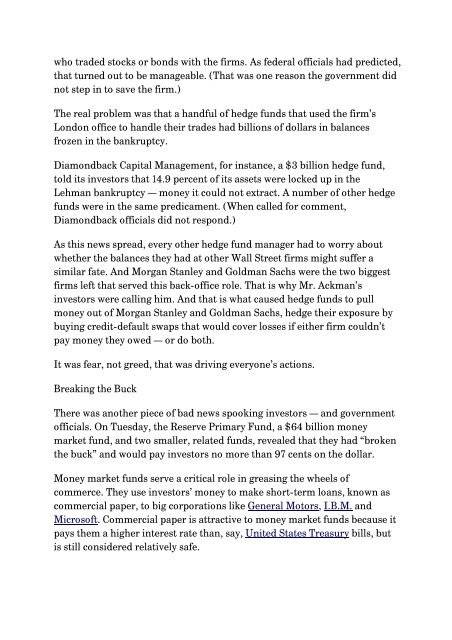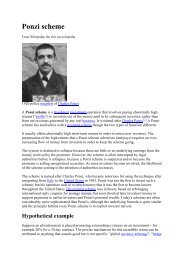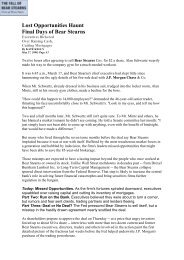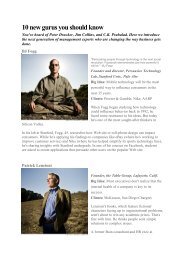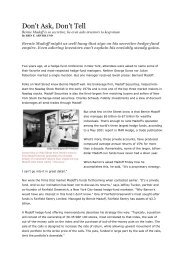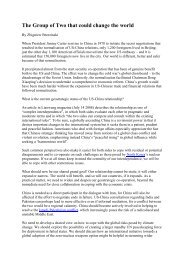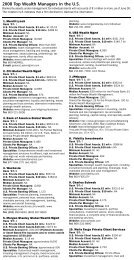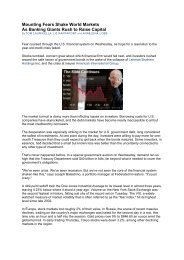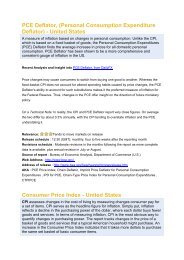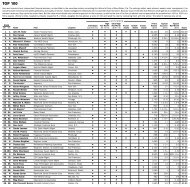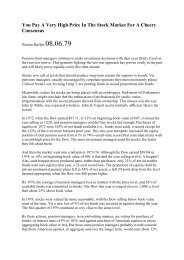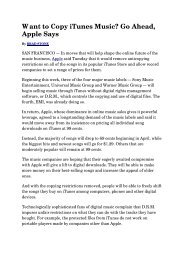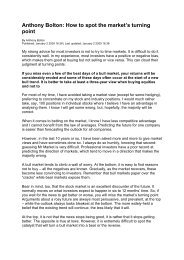As Credit Crisis Spiraled, Alarm Led to Action - Morningbull
As Credit Crisis Spiraled, Alarm Led to Action - Morningbull
As Credit Crisis Spiraled, Alarm Led to Action - Morningbull
You also want an ePaper? Increase the reach of your titles
YUMPU automatically turns print PDFs into web optimized ePapers that Google loves.
who traded s<strong>to</strong>cks or bonds with the firms. <strong>As</strong> federal officials had predicted,<br />
that turned out <strong>to</strong> be manageable. (That was one reason the government did<br />
not step in <strong>to</strong> save the firm.)<br />
The real problem was that a handful of hedge funds that used the firm’s<br />
London office <strong>to</strong> handle their trades had billions of dollars in balances<br />
frozen in the bankruptcy.<br />
Diamondback Capital Management, for instance, a $3 billion hedge fund,<br />
<strong>to</strong>ld its inves<strong>to</strong>rs that 14.9 percent of its assets were locked up in the<br />
Lehman bankruptcy — money it could not extract. A number of other hedge<br />
funds were in the same predicament. (When called for comment,<br />
Diamondback officials did not respond.)<br />
<strong>As</strong> this news spread, every other hedge fund manager had <strong>to</strong> worry about<br />
whether the balances they had at other Wall Street firms might suffer a<br />
similar fate. And Morgan Stanley and Goldman Sachs were the two biggest<br />
firms left that served this back-office role. That is why Mr. Ackman’s<br />
inves<strong>to</strong>rs were calling him. And that is what caused hedge funds <strong>to</strong> pull<br />
money out of Morgan Stanley and Goldman Sachs, hedge their exposure by<br />
buying credit-default swaps that would cover losses if either firm couldn’t<br />
pay money they owed — or do both.<br />
It was fear, not greed, that was driving everyone’s actions.<br />
Breaking the Buck<br />
There was another piece of bad news spooking inves<strong>to</strong>rs — and government<br />
officials. On Tuesday, the Reserve Primary Fund, a $64 billion money<br />
market fund, and two smaller, related funds, revealed that they had “broken<br />
the buck” and would pay inves<strong>to</strong>rs no more than 97 cents on the dollar.<br />
Money market funds serve a critical role in greasing the wheels of<br />
commerce. They use inves<strong>to</strong>rs’ money <strong>to</strong> make short-term loans, known as<br />
commercial paper, <strong>to</strong> big corporations like General Mo<strong>to</strong>rs, I.B.M. and<br />
Microsoft. Commercial paper is attractive <strong>to</strong> money market funds because it<br />
pays them a higher interest rate than, say, United States Treasury bills, but<br />
is still considered relatively safe.


